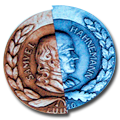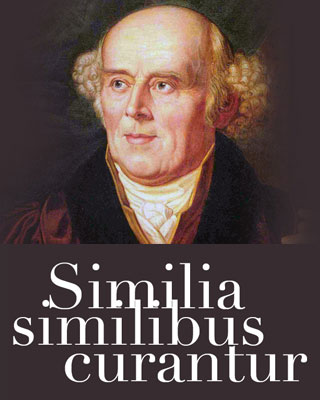similia similibus curantur
LUIMO
Training in Homeopathic Medicine
for the doctor of the future

The LUIMO, the Samuel Hahnemann Association for the International Free University of Homeopathic Medicine in Naples, is one of the most important training centers in homeopathy in Italy. Active since 1954, LUIMO organizes post-graduate homeopathy courses to train homeopaths: the doctors of the future. In addition to the training activity, LUIMO organizes interdisciplinary forums, seminars and conferences on homeopathy.
The need to know the real properties of substances used "ab usu in morbis" in the eighteenth century medicine , pushed the young Samuel Hahnemann to prove them on himself in his state of healthy person. In a first time in high doses, verifying how the shock and the repetition of doses progressively debilitate the organism.
Later he began to decrease the doses, gradually fractionating them, so founding the new homeopathic pharmacology, and a new experimental methodology.
The proving is an inescapable stage in the formation of every homeopathic doctor, even if we should say, of every doctor who wants to know, in the depths, what is the effect of drugs on the body and the human mind.
But who is the best experimental subject ?. Who is the best person capable of assuming substances and report the effects? Hahnemann responds without uncertainty: the MD.
Hahnemann explained this in paragraph 141 of the Organon
But the best provings of the pure effects of simple medicines in altering the human health, and of the artificial diseases and symptoms they are capable of developing in the healthy individual, are those which the healthy, unprejudiced and sensitive physician institutes on himselfwith all the caution and care here enjoined. He knows with the greatest certainty the things he has experienced in his own person.1
1Those trials made by the physician on himself have for him other and inestimable advantages. In the first place, the great truth that the medicinal virtue of all drugs, whereon depends their curative power, lies in the changes of health he has himself undergone from the medicines he has proved, and the morbid states he has himself experienced from them, becomes for him an incontrovertible fact. Again by such noteworthy observations on himself he will be brought to understand his own sensations, his mode of thinking and his disposition (the foundation of all true wisdom gnwqi seuton), and he will be also trained to be, what every physician ought to be, a good observer. All our observations on others are not nearly so interesting as those made on ourselves. The observer of others must always dread lest the experimenter did not feel exactly what he said, or lest he did not describe his sensations with the most appropriate expressions. He must always remain in doubt whether he has not been deceived, at least to some extent. These obstacles to the knowledge of the truth, which can never be thoroughly surmounted in our investigations of the artificial morbid symptoms that occur in others from the ingestion of medicines, cease entirely when we make the trials on ourselves. He who makes these trials on himself knows for certain what he has felt, and each trial is a new inducement for him to investigate the powers of other medicines. He thus becomes more and more practised in the art of observing, of such importance to the physician, by continuing to observe himself, the one on whom he can most rely and who will never deceive him; and this he will do all the more zealously as these experiments on himself promise to give him a reliable knowledge of the true value and significance of the instruments of cure that are still to a great degree unknown to our art. Let it not be imagined that such slight indispositions caused by taking medicines for the purpose of proving them can be in the main injurious to the health. Experience shows on the contrary, that the organism of the prover becomes, by these frequent attacks on his health, all the more expert in repelling all external influences inimical to his frame and all artificial and natural morbific noxious agents, and becomes more hardened to resist everything of an injurious character, by means of these moderate experiments on his own person with medicines. His health becomes more unalterable; he becomes more robust, as all experience shows.
In a few lines Hahnemann introduces us to an unknown world to anyone who has studied a scientific discipline. In order to be a good observer, you must first of all observe yourself. Attention intelligence, curiosity may be useful for the scientist, but the doctor, who should understand the feeling(s) of the patient to be able to heal, must have an subtle, fine tool: his own sensible experience.
The lesson of Hahnemann is so clear that it seems incredible it is so hard to accept for medical and homeopathic education. Only psychoanalysis has used self-observation, transforming it into a kind of introspection, in interpretation.
When experimenting on ourseves, we sharpen our senses, we give more attention to the world around us. We look with new eyes our habitual reactions. We explore the sensible world which underlies the automation of our daily lives.
The Dr. Adele Alma Rodriguez has established, in LUIMO, proving as an essential step of the homeopathic doctor training.
Our days of provings and homeopathic clinic are punctuated by the rhythm of the proving. In summary it takes place in this way:
1. In a firs weekend, where people meet, we distribute files for self-observation. We realizes also many exercises to improve our attention, ameliorate our precision in symptoms description, even with exercises to expand the language.
2. 15 days of self-observation without taking the tested substance. These are important days that serve to check whether, in the absence of remedy, symptoms occur. If the symptom will be present during the trial this means that it will not belong to the remedy. These so, are important negative control test days.
3. A second weekend to check the self-observations and, if necessary, to improve their skills of observation and description. During this weekend the remedies are distributed.
4. 15 days of observation under the effect of the remedy. The assumption of the remedy will be stopped when first symptoms appear. In any case, it will not go beyond the week. The observation will continued all the time.
5. One last weekend to look at the experience results, collect and discuss the symptoms.
Of course during these week-ends we alternate the proving experience with clinical methodology and cases description, but the experience of self-observation and experimentation is privileged.
For this last experiment, we asked the students to write some comments about their experience. Here we report some of their comments with the hope that the reader will be the next to come and live with us this important educational experience.
Through self-observation, I was able to know myself better, to look inside of me. I learned to have a vision of myself more detached, as if from the outside into me. In this way I think I can correct my mistakes, my fears, my "symptoms". Now I can understand the why some symptoms, some feelings and try to improve them alone. During these days of clinical trial I understand the concept of individuality and individuality MORBIDITY. The reaction of any of us was unique, particular, characteristic of that individual, although there were signs of "common", but each had their own reaction, the modalizations were very personal. Improvements and worsening of symptoms were typical of that individual, according to their land of origin, according to their miasma
I start with a clear view in me: each of us responds in testing according to its form, in a personal way, even though there is a core of the same remedy for all. In particular, I noticed that this trial has highlighted my dynamic response relatedto the substance tested. Putting myself in the position of an observer, and not-analyzing, just observing my series of symptoms, I could compare to other provings my dynamic susceptibility and assess its evolution over time. The dynamism of a substance that converges with my personal dynamism opens me to the possibility of a growing state of health. And is the gateway key to recognize the other suffering person in this same evolution, and to think that we can intervene effectively.
I find the self-observation as always very helpful, both as an instrument of knowledge of me, of my reactivity and mode of feeling or ill, both as a teaching tool. In making self-observation, between before and after the beginning of the use of the remedy (for those who have experienced), I noticed a change in the mental anxiety and agitation for the future. They have decreased and, instead, increased the desire: the desire to do, to experience, to get involved, and increased my resistance to fatigue and tiredness.
In the near future we will put even the symptoms that have appeared during the trial, with a discussion about remedy taken.



